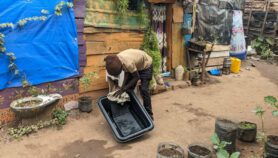By: Catherine Brahic
Send to a friend
The details you provide on this page will not be used to send unsolicited email, and will not be sold to a 3rd party. See privacy policy.
An independent non-profit organisation based in the United States is arranging a global consultation on potential risks and opportunities that nanotechnology represents for developing countries.
As a first step, the Meridian Institute last week (25 January) issued a report reviewing the ways that nanotechnologies could affect developing nations.
The report is intended to set the scene for a meeting of stakeholders, scheduled for April this year in Alexandria, Egypt, where invited participants will discuss this topic.
"We believe the pieces for the responsible use of nanotechology for development are on the table," says the report. "There is an urgent need to begin putting them together."
Todd Barker, who is coordinating the project, says it is time for stakeholders to engage in constructive dialogue and ensure that nanotechnology is used responsibly and to the benefit of developing nations.
"If you wait even three years or five years, it may be too late," says Barker, who is concerned that research and development will progress faster than collaborations between the different sectors involved, such as government agencies and research institutions.
The report describes the growing interest that developing countries are showing for nanotechnology. Brazil, China, India and South Africa appear keen to become global players, judging from the level of government investment and number of researchers and research institutes.
Brazil, for example, has opened three research institutes and created four networks devoted to the field. Its investment for 2004 was about 18.7 million reais (US$7 million), a figure that is projected to grow to about US$25 million by 2007.
India allocated one billion rupees (US$22.8 million) to nanotechnology for the period 2002–2007.
The Meridian Institute says nanotechnology could play a role in achieving the UN Millennium Development Goals — a set of quantified development goals to be achieved by 2015.
Nanotechnologies could, for instance, help filter water, provide cheap, clean energy, rapidly diagnose diseases, make information and communication technologies affordable to developing economies, and make food production cheaper and more efficient.
However, nanotechnology also raises certain challenges in the context of sustainable development. Already the ETC Group — a Canadian non-governmental organisation — has expressed concern that the new industry could be dominated by developed nations (through patents, for example), which would increase the gap between rich and poor nations — a phenomenon labelled the ‘nanodivide’.
The Meridian Institute report outlines this and other areas that could create special challenges. By disassociating production from the extraction of natural resources, nanotechnology could decrease the global role currently played by developing nations. Also, experience in other sectors has shown that regulatory frameworks in developing nations are often inadequate.
The report clearly states that the Meridian Institute will not attempt to determine whether the benefits of nanotechnology for developing nations outweigh their risks, or the other way around. This is a delicate task, which Barker says the forthcoming global dialogue on nanotechnology and the poor will address.
At the end of its report, the Meridian Institute outlines the roles and responsibilities of different stakeholders in ensuring that nanotechnology moves forward responsibly.
Given the role nanotechnologies could play in achieving the UN Millennium Development Goals, governments of rich nations should dedicate a "reasonable" portion of their overseas development assistance to nanotechnology, says the report.
Within the business sector, the authors regret that companies that both advocate "pro-poor business thinking" and are involved in nanotechnology research and development do not appear to foster internal communication between those involved in the two efforts.
The Alexandria meeting will bring together the different sectors, including government representatives from China, India, and South Africa, businesses, non-governmental organisations and international research institutes.
Link to full Nanotechnology and the Poor report and online consultation
COMING SOON: Read more about nanotechnology in SciDev.Net’s new quick guide to nanotechnology, which will be launched early in February 2005.













